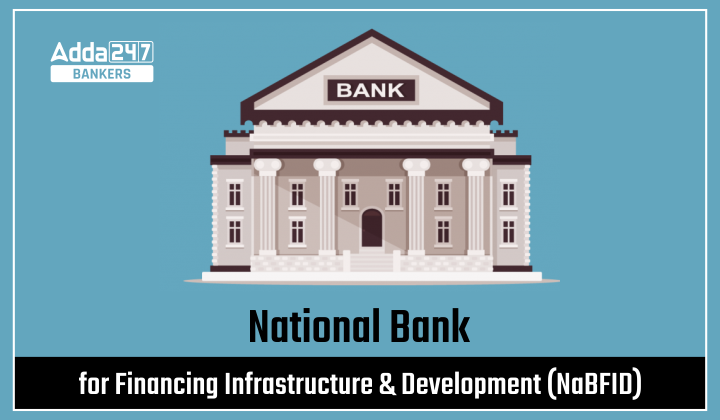Table of Contents
Recent in News: The Centre and the board of the National Bank for Financing Infrastructure and Development (NaBFID) has appointed Rajkiran Rai G as its managing director (MD).
Financial Services Institutions Bureau (FSIB) recommended the name of Monika Kalia for the position of Deputy Managing Director (CFO) in the National Bank for Financing Infrastructure and Development (NABFID).
B.S.Venkatesha has been recommended to the position of DMD (Chief Risk Officer) in NaBFID. While Kalia is an Executive Director at Bank of India, Venkatesha was till recently Chief Risk Officer at Union Bank of India.
What is NaBFID?
NaBFID is a development financial institution for infrastructure financing. This is special financial institution for long term financing. NaBFID was announced in the Budget 2021.
The National Bank for Financing Infrastructure and Development (NaBFID) Act, 2021 received the assent of the President on March 28, 2021 and has come into force w.e.f. April 19, 2021.. The Bill seeks to establish the National Bank for Financing Infrastructure and Development (NaBFID) as the principal development financial institution (DFIs) for infrastructure financing.
NaBFID shall be regulated and supervised as an All India Financial Institution (AIFI) by the Reserve Bank under Sections 45L and 45N of the Reserve Bank of India Act, 1934. It shall be the fifth AIFI after EXIM Bank, NABARD, NHB and SIDBI.
NaBFID will be set up as a corporate body with authorised share capital of one lakh crore rupees. The shares of NaBFID may be held by:
(i) central government
(ii) multilateral institutions
(iii) sovereign wealth funds
(iv) pension funds
(v) insurers
(vi) financial institutions
(vii) banks
(viii) any other institution prescribed by the central government.
Initially, the central government will own 100% shares of the institution which may subsequently be reduced up to 26%.
Objective:
- To directly or indirectly lend, invest, or attract investments for infrastructure projects located entirely or partly in India.
- Development objectives include facilitating the development of the market for bonds, loans, and derivatives for infrastructure financing.
What are the functions of NaBFID?
- Extending loans and advances for infrastructure projects.
- Taking over or refinancing such existing loans.
- Attracting investment from private sector investors and institutional investors for infrastructure projects.
- Organising and facilitating foreign participation in infrastructure projects.
- Facilitating negotiations with various government authorities for dispute resolution in the field of infrastructure financing.
- Providing consultancy services in infrastructure financing.
What are the source of funds?
- The government has committed a Rs 5,000-crore grant over and above Rs 20,000-crore equity capital for NaBFID.
- NaBFID may raise money in the form of loans or otherwise both in Indian rupees and foreign currencies, or secure money by the issue and sale of various financial instruments including bonds and debentures.
- NaBFID may borrow money from:
(i) central government,
(ii) Reserve Bank of India (RBI),
(iii) scheduled commercial banks,
(iii) mutual funds, and
(iv) multilateral institutions such as World Bank and Asian Development Bank.
What is the structure and management of NaBFID?
- NaBFID will be governed by a Board of Directors.
- The members of the Board include:
(i) the Chairperson appointed by the central government in consultation with RBI, present Chairperson KV Kamnath
(ii) a Managing Director, present Rajkiran Rai G
(iii) up to three Deputy Managing Directors among others.
Support from the Central Government:
- The central government will provide grants worth Rs. 5,000 crore to NaBFID by the end of the first financial year.
- The government will also provide guarantee at a concessional rate of up to 0.1% for borrowing from multilateral institutions, sovereign wealth funds, and other foreign funds.
- Costs towards insulation from fluctuations in foreign exchange (in connection with borrowing in foreign currency) may be reimbursed by the government in part or full.
- Upon request by NaBFID, the government may guarantee the bonds, debentures, and loans issued by NaBFID.
Who is Rajkiran Rai G?
Rajkiran Rai G, a former managing director of the Union Bank of India, has been recommended by the Financial Services Institutions Bureau to lead the newly established NaBFID.
General Awareness Quiz Series 2022: 2 september
UNCTAD report: 7.3% of Indian owned digital currency as of 2021
Recent Posts
| Current Affairs April 2022 | |




 GA Capsule for SBI Clerk Mains 2025, Dow...
GA Capsule for SBI Clerk Mains 2025, Dow...
 The Hindu Review October 2022: Download ...
The Hindu Review October 2022: Download ...
 Daily Current Affairs 21st April 2025, I...
Daily Current Affairs 21st April 2025, I...





